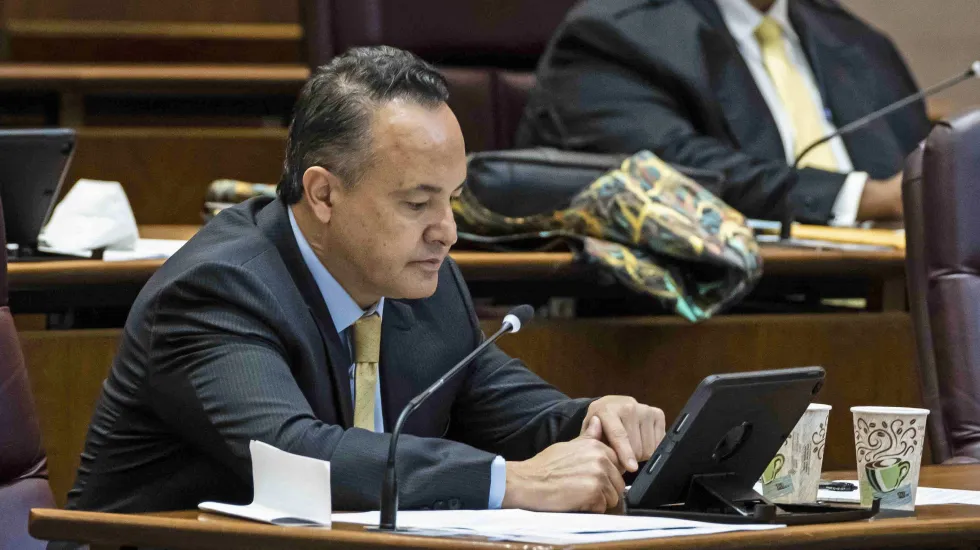
Better late than never, the Chicago City Council on Wednesday finally entered the 21st Century with the debut of electronic voting — something that’s been a fixture in Springfield for years.
“Ladies and gentlemen, we’re about to make history here,” Mayor Lori Lightfoot declared shortly after 1:30 p.m., when the first item on the Finance Committee agenda was finally called for a vote.
City Clerk Anna Valencia, who has championed the $3.5 million modernization project, instructed alderpersons: “Please get out your IPads and log in. Please hit refresh. The voting is now open. Raise your hand if you need help and we will come around.”
A few minutes later, Valencia declared the voting closed. The vote, 48 to 0, was clearly displayed on three giant video screens above the mayor’s rostrum with bright green boxes beside alderpersons voting yes.
It was the first major change in the archaic way the council has does business since 2017, when a court order forced members to begin each meeting with 30 minutes of public comment. During subsequent roll calls Wednesday, Valencia had to admonish alderpersons by name to cast their votes and accept other voice votes.
“Congratulations on your first electronic voting venture,” Mayor Lori Lightfoot when the meeting ended.
The belated entry into the electronic voting age was delayed by 3.5 hours.
That’s how long alderpersons spent on commemorative resolutions honoring: outstanding women; former Mayor Harold Washington; and the 24th District police officers who made the hate crime arrests following ugly episodes of anti-Semitism in Rogers Park.

When the council finally got down to real business, the action was fast and furious.
• By a roll call vote of 34 to 13, the council agreed to pay $1.67 million to compensate five people dragged from a car by CPD officers responding to rampant looting at the Brickyard shopping center in May 2020. The settlement stalled last month after a racially charged committee debate. Ald. Ray Lopez (15th) warned then that rewarding Mia Wright and her friends would be “opening a Pandora’s box” to a parade of lawsuits from people who had been “willfully trying to destroy the city” on that tumultuous weekend of protests, looting and mayhem.
• Members also joined the bandwagon of cities around the globe mandating divestment of city funds from fossil fuel companies as the world to promote a clean energy future for a world buffeted by climate change. Roughly 1,500 institutions with combined assets of $39 trillion have committed to “some form of divestment,” alderpersons have been told.
• Council members also imposed two more years of penalties against developers who tear down single-family homes or multi-unit buildings in Pilsen and in neighborhoods along the wildly-popular 606 trail.
• A $107.8 million deal was approved paving the way for transferring 202 acres of city-owned land at O’Hare International Airport to be used for a western access road that’s been talked about for 30 years.
• The council empowered Planning and Development Commissioner Maurice Cox and Housing Commissioner Marisa Novara to reach “land banking agreements” with the Cook County Land Bank Authority to provide a new tool to reclaim abandoned and distressed properties concentrated in communities of color.
• Alderpersons agreed to spend $3.5 million in tax-increment-financing funds for parking, traffic signal, roadway and pedestrian improvements needed to pave the way for converting the former Morton Salt shed, 1357 N. Elston Ave., into a 4,000-seat concert venue with its own restaurant space.
• They also signed off on a pair of settlements: $450,000 to compensate the family of a 66-year-old man killed in April 2017 after colliding with an unmarked police vehicle speeding through Roseland; and $175,000 from a July 2017 crash involving a city employee and a woman left with “severe and permanent injuries.”
• And, they approved a long-stalled ordinance that would prohibit any person convicted of treason, sedition, related offenses, or a hate crime, from doing business with the city.
Also during Wednesday’s meeting, the Latino Caucus introduced a revised city ward map it hopes to present to voters in a June 28 referendum that reflects ten changes made to accommodate CHANGE Illinois to keep “key communities from being significantly splintered. “
Those changes include keeping Englewood in two wards, instead of six or seven, and keeping Washington Park in the same ward as Woodlawn. They change some boundaries in six other wards to align with the map drawn by the CHANGE Illinois commission.
And Ald. Silvana Tabares (23rd) introduced the latest in a parade of changes to Chicago’s ethics ordinance — this time, a measure that would prohibit the spouses and domestic parties of alderpersons and citywide elected officials from being paid lobbyists.
The ordinance was promptly shunted off to the Rules Committee, where legislation opposed by the mayor traditionally goes to die.







